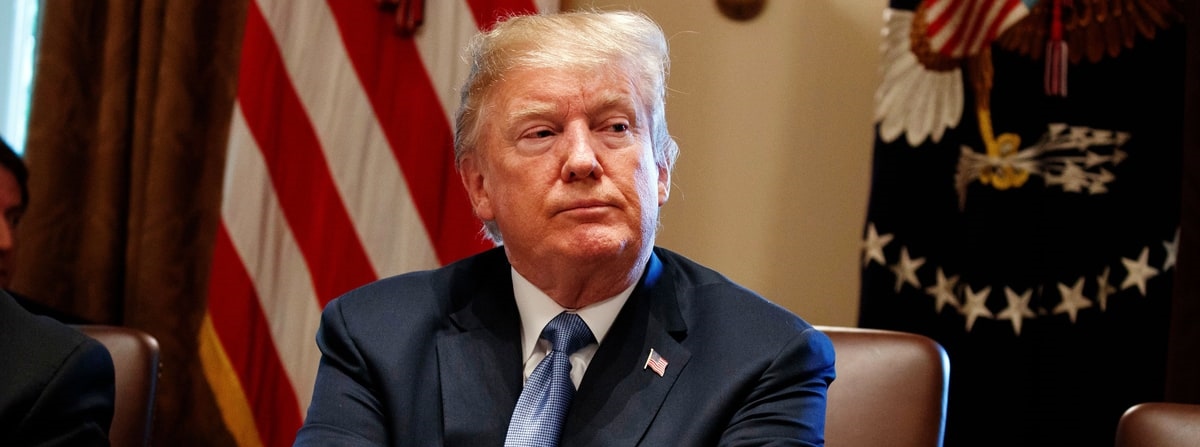Supreme Court upholds travel ban
June 27, 2018 | Expert Insights

The US supreme court has officially upheld the Trump administration’s controversial travel ban (colloquially known as the Muslim ban) as constitutional. The narrow 5-4 ruling noted that President Trump's travel restriction fell "squarely" within the president's authority.
Background
On the 27th of January 2017, President Donald Trump signed the "Protecting the Nation from Foreign Terrorist Entry into the United States“ executive order. This executive order, with immediate effect temporarily suspended the U.S Refugee Admissions Program (USRAP) for 120 days. It also halted for 90 days, entry of people from seven Muslim-majority nations (Iraq, Iran, Libya, Somalia, Sudan, Yemen and Syria), from entering the US.
The order originally included US Green card holders but the same was later retracted by intervention from the White House. The order unleashed chaos on the immigration systems in the US and overseas. Some travellers who had travelled to the US with valid visas were detained at US ports of entry. Other travellers embarking for the US from airports across the world were pulled of aircrafts.
Federal judge of the Eastern District of New York, Ann Donnelly blocked a part of President Trump’s order saying refugees and others who had travelled to the US with valid visas and being held at US airports should not be sent back to their home countries. But the judge stopped short of permitting the passengers entry into the country. They remain confined to a section of the airport.
Other federal judges Massachusetts, Virginia and Washington soon issued similar rulings.
President Donald Trump has often accused of displaying characteristics that could be labelled as anti-Muslim and bigoted. In 2017, he retweeted a number of anti-Muslim videos by a far-right political party in England, which attracted widespread condemnation including a rare response from UK Prime Minister, Theresa May.
Analysis
In the 5-4 opinion written by Chief Justice John Roberts, the court found that Trump's travel restriction fell "squarely" within the president's authority. Furthermore, it also rejected claims that the ban was motivated by religious hostility.
Thus, effectively, the Supreme Court has reversed the ruling of the 9th Circuit Court that had attempted to put the travel ban on hold. It has also sent the case back to the 9th Circuit to reconsider. "The [order] is expressly premised on legitimate purposes: preventing entry of nationals who cannot be adequately vetted and inducing other nations to improve their practices," Roberts wrote. "The text says nothing about religion."
The court’s four liberals dissented. Justice Sonia Sotomayor joined by her colleague Ruth Bader Ginsburg wrote a particularly scathing statement against the ruling. “The Court’s decision today fails to safeguard that fundamental principle. It leaves undisturbed a policy first advertised openly and unequivocally as a “total and complete shutdown of Muslims entering the United States” because the policy now masquerades behind a façade of national-security concerns.” The statement also added that there was evidence of Trump’s anti-Muslim bias. “Based on the evidence in the record, a reasonable observer would conclude that the Proclamation was motivated by anti-Muslim animus. That alone suffices to show that plaintiffs are likely to succeed on the merits of their Establishment Clause claim.”
Trump, who issued the ban in September, hailed the ruling in the case through his Twitter platform. "Though I am disappointed by the outcome, I am heartened that our system of government worked as the founders intended," Neal Katyal, attorney for the challengers, said in a statement. "Now that the Court has upheld it, it is up to Congress to do its job and reverse President Trump’s unilateral and unwise travel ban."
“The Supreme Court’s decision today was unsurprising," said Stephen Yale-Loehr, the co-author of a 21-volume book on U.S. immigration law. Yale-Loehr signed onto an amicus brief on behalf of Hawaii. "Because immigration touches on national sovereignty and foreign relations, courts have generally deferred to the president on immigration issues,” he said.
The court’s decision has already prompted protests from liberals across the country.
Assessment
Our assessment is that during the presidential election campaign, Donald Trump made many election promises, many of which are difficult to implement. Immigration was a cornerstone of much of his campaign. However, given the controversial nature of the travel ban, this could affect his political party (Republicans) in the upcoming mid-term elections. It remains to be seen how this will affect those migrating from countries like Iran.








Comments